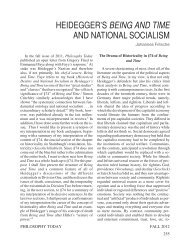SPINOZA'S VIRTUOUS PASSIONS
SPINOZA'S VIRTUOUS PASSIONS
SPINOZA'S VIRTUOUS PASSIONS
You also want an ePaper? Increase the reach of your titles
YUMPU automatically turns print PDFs into web optimized ePapers that Google loves.
772 MATTHEW J. KISNER<br />
This solution can be generalized to the case of bodies as well. As<br />
in the mental case, being affected by bodies can involve our own activity<br />
as well. Even when we are passively affected by external bodies<br />
the changes in our bodies are brought about partially through the<br />
power of our own bodies. Remember the example of the sandcastle:<br />
one cannot mold the sandcastle without assistance from the power of<br />
the sand to maintain its shape. The same is true for the case of the antivenom:<br />
the antivenom is only effective because of my bodily mechanisms<br />
by which I process and circulate the antivenom to all of my tissues.<br />
If the ranger had come too late, I would not have the power to<br />
assist him in this way. Indeed, if I were purely passive and relied entirely<br />
on the power of the antivenom, the ranger’s efforts would be no<br />
more effective than pumping antivenom into a corpse. Furthermore,<br />
to the extent that the effect is brought about through my power, the<br />
effect better expresses my conatus and is to my benefit. It is not hard<br />
to imagine that my contribution to the effect involves sufficient activity<br />
that I actually become more active by being passively affected by<br />
the antivenom.<br />
One might object that this solution has not really shown that the<br />
passions can be advantageous after all: according to the solution, passive<br />
pleasure only increases our power to the extent that the affect is<br />
active; the general idea is that the adequacy and activity of the idea<br />
overpowers its passivity and inadequacy. Consequently, the objection<br />
goes, we cannot really conclude that one’s passivity increases one’s<br />
power; rather, the increase comes from one’s activity. 35 The objection<br />
is correct in one sense: at the mental level, an inadequate idea is<br />
passive to the extent that it does not represent some aspect of a true<br />
idea. Clearly it does not make sense to say that our activity and<br />
power is increased by not representing something. However, there is<br />
a sense in which passivity itself increases one’s power: being passive<br />
35<br />
This is Hoffman’s reason for thinking that passive pleasure ultimately<br />
cannot be explained in Spinoza’s system. “While it [Hoffman’s best proposed<br />
solution] may succeed in explaining how increasing the ways in which we<br />
can be affected by external objects increases our power of acting, and so<br />
succeeds in explaining how being affected by something external can be<br />
pleasurable, it does not succeed in making room for passive joy. Insofar as<br />
we are affected by something external that increases our power of acting, we<br />
are active, not passive.” “Three Dualist Theories of the Passions,” 179.
















